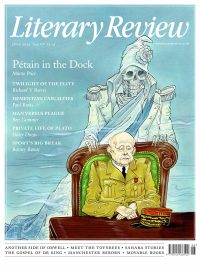Rónán Hession
Blasts from the Past
Austral
By Carlos Fonseca (Translated from Spanish by Megan McDowell)
MacLehose Press 222p £18.99
Austral is the third novel by the Costa Rican-Puerto Rican writer Carlos Fonseca, though the first to be published in the UK, where he lives, working as a professor of postcolonial Latin American literature and culture at Cambridge. The novel begins with a middle-aged academic, Julio Gamboa, receiving a postcard sent from a remote Argentinian artists’ commune on behalf of an ex-girlfriend from thirty years ago, Alicia Abravanel. Their relationship was brief and his memories of it are buried, but she went on to have a successful writing career before suffering a debilitating stroke, which left her mute from aphasia. The postcard informs him that Alicia has died and that she had an ‘irrevocable wish’ for him to edit her final manuscript. Julio drops everything to head down to Argentina, even though he thinks that her dying wish ‘seemed like a mistake, or, even worse, a prank’, doubting ‘the absurd notion that out of everyone, he was the one who knew her best’. It’s a remark that anticipates the reader’s dawning sense of the implausibility of the premise at the book’s centre.
Alicia’s unfinished book tells the story of an eccentric anthropologist who studies the bizarre attempts by the anti-Semite Bernhard Förster and his wife, Elisabeth Förster-Nietzsche (sister of the philosopher), to establish an Aryan colony in Paraguay called New Germany. In studying the failed commune, located in the area that

Sign Up to our newsletter
Receive free articles, highlights from the archive, news, details of prizes, and much more.@Lit_Review
Follow Literary Review on Twitter
Twitter Feed
Under its longest-serving editor, Graydon Carter, Vanity Fair was that rare thing – a New York society magazine that published serious journalism.
@PeterPeteryork looks at what Carter got right.
Peter York - Deluxe Editions
Peter York: Deluxe Editions - When the Going Was Good: An Editor’s Adventures During the Last Golden Age of Magazines by Graydon Carter
literaryreview.co.uk
Henry James returned to America in 1904 with three objectives: to see his brother William, to deliver a series of lectures on Balzac, and to gather material for a pair of books about modern America.
Peter Rose follows James out west.
Peter Rose - The Restless Analyst
Peter Rose: The Restless Analyst - Henry James Comes Home: Rediscovering America in the Gilded Age by Peter Brooks...
literaryreview.co.uk
Vladimir Putin served his apprenticeship in the KGB toward the end of the Cold War, a period during which Western societies were infiltrated by so-called 'illegals'.
Piers Brendon examines how the culture of Soviet spycraft shaped his thinking.
Piers Brendon - Tinker, Tailor, Sleeper, Troll
Piers Brendon: Tinker, Tailor, Sleeper, Troll - The Illegals: Russia’s Most Audacious Spies and the Plot to Infiltrate the West by Shaun Walker
literaryreview.co.uk